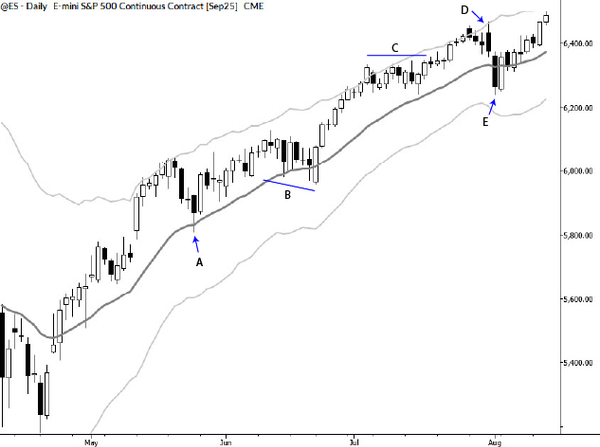Patience... patience

An interesting debate emerged in the comments to one of my posts. In the post, I had suggested the discipline was the most important thing; a reader countered that patience was more important. Now, I could (and did) argue that patience is a subset of discipline, but the discussion could quickly devolve into an argument over the exact meaning of words--all of this could so easily miss the point: patience is absolutely essential for success in trading. And learning to have patience... well... it sucks!
The patience to wait for an entry
People who haven't traded often have trouble understanding the psychological stresses of trading. I can remember my early days: I'd have a plan and I would know exactly what I would/could/should do and which markets I would trade. I would review this plan, write it down on paper so it was "real", and then resolve to follow it exactly. Then, when the hoped for entry didn't develop, I found myself almost magically in another trade in an unrelated market. I wish I could tell you this only happened once, but it was a part of my struggle several times, and then again when I switched markets and asset classes.
From a logical perspective, this is baffling. It's beyond stupid. But nearly all traders do it, and some never get over it. The simple patience to wait for the right entry to develop is truly an essential skill in trading, and, if you can't manage to do this, I don't think you can be a trader.
We can come up with whatever powerful and correct imagery we wish: for instance, a hawk sitting motionless on a pole, watching the grass below for the telltale whisper of lunch. That hawk will sit for hours if need be, and then pounce at exactly the right moment. Far more often than not, things work out well for the hawk and badly for the "lunch animal". Ideas like this should be compelling to a developing trader, but we can rehearse and pound the ideas into our heads, only to do something stupid in a I MUST TRADE NOW moment the next day. What to do about it? Hold on, we'll get to that, but let's look at a few other ways patience is important.
The patience to be sure you have an edge
This one seems obvious too: It shouldn't be too hard for me to convince you that the markets are a difficult place and that you don't stand a chance without an edge. It's also not terribly hard for someone to learn how to develop and verify an edge. Knowing this, it would seem to be logical that any trader should carefully do the work to be sure he has a reason to risk money in the market, right? Of course, this doesn't always happen.
Again, the solutions I'm going to offer will help here, but it's also worth spending a few moments on the intellectual side of this. Whether you are trading or investing, you don't have any reason to risk money or time until you are sure you have an edge. If you got a system idea from a chatroom, are trading some indicator or candle pattern, or just think you can figure out what companies make really cool products, you don't have an edge. I would argue you can't be reasonably certain you have an edge until you have some good data (ideally back and forward tested) that shows an edge, so consider this carefully before you risk money. Solutions in a few lines, but let's look at one more kind of patience we need.
The patience to become a trader
Now, I know this borders on New Agey-touchy feely stuff, but there's truth here: if you want to do this well, you don't trade, you must become a trader. I think this is true whether you develop computer trading systems, actively trade technical patterns, or invest in longer-term stocks based on fundamental criteria--no matter how you are involved in the market, you aren't likely to be successful until you have become a trader. This journey can be long and frustrating; it takes time and conviction. You'll probably want to give up along the way, but just know that this is really the only way to succeed.
Many disciplines have clear apprenticeship paths, so the developing cook/shoemaker/architect is more or less assured of putting in the time needed. This process is also designed to slow things down so that the student doesn't feel the need to push through and work too fast. While learning, growing, and developing skills, an apprenticeship program virtually forces patience. Yes, you can find someone selling you programs for trading that claim to do this, but the true apprenticeship path probably lasts 3-5 years. Does your two month course do the same thing? Of course not. You must be patient with yourself and give yourself time to grow into being and becoming a trader--there's no other way. (Despite the already brewing arguments from the quants who think it might be different if we're coding. Even here, there's a long path to actually being able to effectively implement these ideas in the market.)
What to do about it
I can remember, as a very young boy, my grandmother telling me to never pray for patience because that was a lesson usually taught in miserable ways! Know this: if you have decided to be a trader, you've already committed to accepting the brutal lessons of developing patience, and the market god is a ruthless teacher! Though the market will certainly teach you these lessons if you stay in the game long enough, let me share a few thoughts that might help:
- None of this makes rational sense. Accept that from the beginning, and don't expect that you can rationalize your way around these issues. Here, we are confronting behavioral and emotional factors that are, to a large degree, outside the umbrella of rational control. Fixing behavioral problems requires a different tool set, and you be careful of emotions (e.g., anger, frustration, despair) that can make the process harder. Be kind and... um... patient with yourself as you work through these issues.
- It is a discipline problem. At the same time you are being kind to yourself, inject a healthy component of "tough love." If you can't solve these issues, you're probably going to eventually lose every dollar you risk in the market. This stuff matters, and you have to hold yourself to the highest standards. Demand perfect compliance to your rules.
- Rules and accountability help. If you don't know what you're supposed to do, then it's pretty hard to do it. Even with those rules, most of us will discover that it's still harder than we might expect. Setting up some kind of accountability--to a mentor, to a family member, to a community, or even to yourself--is a good idea. Get some rules and then get some accountability.
- It just takes time. Back to my grandmother's point--developing patience sucks because there's a lot of this that just takes time. The new trader is too hungry for action, and hands will often seem to make trades without conscious control. The new trader is a swirling mass of emotions and energy; we can try to channel those, but a pressure cooker needs a vent--otherwise we have a bomb.
- Limit the damage while you learn. If there's one truth I've learned about learning to trade, it's this: you're going to make mistakes. As a new trader, you're going to make a lot of them, and you may make them for years. Make yourself earn the right to trade bigger. Monitor your growth and performance, and be smart about it. Don't plan on supporting yourself from your trading income, perhaps for a very long time. All of this is designed to give yourself the time and space you need to grow and develop as a trader.
Just a few thoughts here that may help someone to take a few more steps along their path. Be prepared for how hard this is and how long it can take, and limit the damage while you learn--simple stuff, but powerful solutions.



